- Home
- E. M. Forster
Works of E M Forster Page 2
Works of E M Forster Read online
Page 2
Lilia’s next letter was also from Monteriano, and Philip grew quite enthusiastic.
“They’ve stopped there over a week!” he cried. “Why! I shouldn’t have done as much myself. They must be really keen, for the hotel’s none too comfortable.”
“I cannot understand people,” said Harriet. “What can they be doing all day? And there is no church there, I suppose.”
“There is Santa Deodata, one of the most beautiful churches in Italy.”
“Of course I mean an English church,” said Harriet stiffly. “Lilia promised me that she would always be in a large town on Sundays.”
“If she goes to a service at Santa Deodata’s, she will find more beauty and sincerity than there is in all the Back Kitchens of Europe.”
The Back Kitchen was his nickname for St. James’s, a small depressing edifice much patronized by his sister. She always resented any slight on it, and Mrs. Herriton had to intervene.
“Now, dears, don’t. Listen to Lilia’s letter. ‘We love this place, and I do not know how I shall ever thank Philip for telling me it. It is not only so quaint, but one sees the Italians unspoiled in all their simplicity and charm here. The frescoes are wonderful. Caroline, who grows sweeter every day, is very busy sketching.’”
“Every one to his taste!” said Harriet, who always delivered a platitude as if it was an epigram. She was curiously virulent about Italy, which she had never visited, her only experience of the Continent being an occasional six weeks in the Protestant parts of Switzerland.
“Oh, Harriet is a bad lot!” said Philip as soon as she left the room. His mother laughed, and told him not to be naughty; and the appearance of Irma, just off to school, prevented further discussion. Not only in Tracts is a child a peacemaker.
“One moment, Irma,” said her uncle. “I’m going to the station. I’ll give you the pleasure of my company.”
They started together. Irma was gratified; but conversation flagged, for Philip had not the art of talking to the young. Mrs. Herriton sat a little longer at the breakfast table, re-reading Lilia’s letter. Then she helped the cook to clear, ordered dinner, and started the housemaid turning out the drawing-room, Tuesday being its day. The weather was lovely, and she thought she would do a little gardening, as it was quite early. She called Harriet, who had recovered from the insult to St. James’s, and together they went to the kitchen garden and began to sow some early vegetables.
“We will save the peas to the last; they are the greatest fun,” said Mrs. Herriton, who had the gift of making work a treat. She and her elderly daughter always got on very well, though they had not a great deal in common. Harriet’s education had been almost too successful. As Philip once said, she had “bolted all the cardinal virtues and couldn’t digest them.” Though pious and patriotic, and a great moral asset for the house, she lacked that pliancy and tact which her mother so much valued, and had expected her to pick up for herself. Harriet, if she had been allowed, would have driven Lilia to an open rupture, and, what was worse, she would have done the same to Philip two years before, when he returned full of passion for Italy, and ridiculing Sawston and its ways.
“It’s a shame, Mother!” she had cried. “Philip laughs at everything — the Book Club, the Debating Society, the Progressive Whist, the bazaars. People won’t like it. We have our reputation. A house divided against itself cannot stand.”
Mrs. Herriton replied in the memorable words, “Let Philip say what he likes, and he will let us do what we like.” And Harriet had acquiesced.
They sowed the duller vegetables first, and a pleasant feeling of righteous fatigue stole over them as they addressed themselves to the peas. Harriet stretched a string to guide the row straight, and Mrs. Herriton scratched a furrow with a pointed stick. At the end of it she looked at her watch.
“It’s twelve! The second post’s in. Run and see if there are any letters.”
Harriet did not want to go. “Let’s finish the peas. There won’t be any letters.”
“No, dear; please go. I’ll sow the peas, but you shall cover them up — and mind the birds don’t see ‘em!”
Mrs. Herriton was very careful to let those peas trickle evenly from her hand, and at the end of the row she was conscious that she had never sown better. They were expensive too.
“Actually old Mrs. Theobald!” said Harriet, returning.
“Read me the letter. My hands are dirty. How intolerable the crested paper is.”
Harriet opened the envelope.
“I don’t understand,” she said; “it doesn’t make sense.”
“Her letters never did.”
“But it must be sillier than usual,” said Harriet, and her voice began to quaver. “Look here, read it, Mother; I can’t make head or tail.”
Mrs. Herriton took the letter indulgently. “What is the difficulty?” she said after a long pause. “What is it that puzzles you in this letter?”
“The meaning— “ faltered Harriet. The sparrows hopped nearer and began to eye the peas.
“The meaning is quite clear — Lilia is engaged to be married. Don’t cry, dear; please me by not crying — don’t talk at all. It’s more than I could bear. She is going to marry some one she has met in a hotel. Take the letter and read for yourself.” Suddenly she broke down over what might seem a small point. “How dare she not tell me direct! How dare she write first to Yorkshire! Pray, am I to hear through Mrs. Theobald — a patronizing, insolent letter like this? Have I no claim at all? Bear witness, dear” — she choked with passion— “bear witness that for this I’ll never forgive her!”
“Oh, what is to be done?” moaned Harriet. “What is to be done?”
“This first!” She tore the letter into little pieces and scattered it over the mould. “Next, a telegram for Lilia! No! a telegram for Miss Caroline Abbott. She, too, has something to explain.”
“Oh, what is to be done?” repeated Harriet, as she followed her mother to the house. She was helpless before such effrontery. What awful thing — what awful person had come to Lilia? “Some one in the hotel.” The letter only said that. What kind of person? A gentleman? An Englishman? The letter did not say.
“Wire reason of stay at Monteriano. Strange rumours,” read Mrs. Herriton, and addressed the telegram to Abbott, Stella d’Italia, Monteriano, Italy. “If there is an office there,” she added, “we might get an answer this evening. Since Philip is back at seven, and the eight-fifteen catches the midnight boat at Dover — Harriet, when you go with this, get 100 pounds in 5 pound notes at the bank.”
“Go, dear, at once; do not talk. I see Irma coming back; go quickly.... Well, Irma dear, and whose team are you in this afternoon — Miss Edith’s or Miss May’s?”
But as soon as she had behaved as usual to her grand-daughter, she went to the library and took out the large atlas, for she wanted to know about Monteriano. The name was in the smallest print, in the midst of a woolly-brown tangle of hills which were called the “Sub-Apennines.” It was not so very far from Siena, which she had learnt at school. Past it there wandered a thin black line, notched at intervals like a saw, and she knew that this was a railway. But the map left a good deal to imagination, and she had not got any. She looked up the place in “Childe Harold,” but Byron had not been there. Nor did Mark Twain visit it in the “Tramp Abroad.” The resources of literature were exhausted: she must wait till Philip came home. And the thought of Philip made her try Philip’s room, and there she found “Central Italy,” by Baedeker, and opened it for the first time in her life and read in it as follows: —
MONTERIANO (pop. 4800). Hotels: Stella d’Italia, moderate only; Globo, dirty. * Caffe Garibaldi. Post and Telegraph office in Corso Vittorio Emmanuele, next to theatre. Photographs at Seghena’s (cheaper in Florence). Diligence (1 lira) meets principal trains.
Chief attractions (2-3 hours): Santa Deodata, Palazzo Pubblico, Sant’ Agostino, Santa Caterina, Sant’ Ambrogio, Palazzo Capocchi. Guide (2 lire) unnecessary. A walk round the Walls s
hould on no account be omitted. The view from the Rocca (small gratuity) is finest at sunset.
History: Monteriano, the Mons Rianus of Antiquity, whose Ghibelline tendencies are noted by Dante (Purg. xx.), definitely emancipated itself from Poggibonsi in 1261. Hence the distich, “POGGIBONIZZI, FAUI IN LA, CHE MONTERIANO SI FA CITTA!” till recently enscribed over the Siena gate. It remained independent till 1530, when it was sacked by the Papal troops and became part of the Grand Duchy of Tuscany. It is now of small importance, and seat of the district prison. The inhabitants are still noted for their agreeable manners.
The traveller will proceed direct from the Siena gate to the Collegiate Church of Santa Deodata, and inspect (5th chapel on right) the charming Frescoes....
Mrs. Herriton did not proceed. She was not one to detect the hidden charms of Baedeker. Some of the information seemed to her unnecessary, all of it was dull. Whereas Philip could never read “The view from the Rocca (small gratuity) is finest at sunset” without a catching at the heart. Restoring the book to its place, she went downstairs, and looked up and down the asphalt paths for her daughter. She saw her at last, two turnings away, vainly trying to shake off Mr. Abbott, Miss Caroline Abbott’s father. Harriet was always unfortunate. At last she returned, hot, agitated, crackling with bank-notes, and Irma bounced to greet her, and trod heavily on her corn.
“Your feet grow larger every day,” said the agonized Harriet, and gave her niece a violent push. Then Irma cried, and Mrs. Herriton was annoyed with Harriet for betraying irritation. Lunch was nasty; and during pudding news arrived that the cook, by sheer dexterity, had broken a very vital knob off the kitchen-range. “It is too bad,” said Mrs. Herriton. Irma said it was three bad, and was told not to be rude. After lunch Harriet would get out Baedeker, and read in injured tones about Monteriano, the Mons Rianus of Antiquity, till her mother stopped her.
“It’s ridiculous to read, dear. She’s not trying to marry any one in the place. Some tourist, obviously, who’s stopping in the hotel. The place has nothing to do with it at all.”
“But what a place to go to! What nice person, too, do you meet in a hotel?”
“Nice or nasty, as I have told you several times before, is not the point. Lilia has insulted our family, and she shall suffer for it. And when you speak against hotels, I think you forget that I met your father at Chamounix. You can contribute nothing, dear, at present, and I think you had better hold your tongue. I am going to the kitchen, to speak about the range.”
She spoke just too much, and the cook said that if she could not give satisfaction — she had better leave. A small thing at hand is greater than a great thing remote, and Lilia, misconducting herself upon a mountain in Central Italy, was immediately hidden. Mrs. Herriton flew to a registry office, failed; flew to another, failed again; came home, was told by the housemaid that things seemed so unsettled that she had better leave as well; had tea, wrote six letters, was interrupted by cook and housemaid, both weeping, asking her pardon, and imploring to be taken back. In the flush of victory the door-bell rang, and there was the telegram: “Lilia engaged to Italian nobility. Writing. Abbott.”
“No answer,” said Mrs. Herriton. “Get down Mr. Philip’s Gladstone from the attic.”
She would not allow herself to be frightened by the unknown. Indeed she knew a little now. The man was not an Italian noble, otherwise the telegram would have said so. It must have been written by Lilia. None but she would have been guilty of the fatuous vulgarity of “Italian nobility.” She recalled phrases of this morning’s letter: “We love this place — Caroline is sweeter than ever, and busy sketching — Italians full of simplicity and charm.” And the remark of Baedeker, “The inhabitants are still noted for their agreeable manners,” had a baleful meaning now. If Mrs. Herriton had no imagination, she had intuition, a more useful quality, and the picture she made to herself of Lilia’s FIANCE did not prove altogether wrong.
So Philip was received with the news that he must start in half an hour for Monteriano. He was in a painful position. For three years he had sung the praises of the Italians, but he had never contemplated having one as a relative. He tried to soften the thing down to his mother, but in his heart of hearts he agreed with her when she said, “The man may be a duke or he may be an organ-grinder. That is not the point. If Lilia marries him she insults the memory of Charles, she insults Irma, she insults us. Therefore I forbid her, and if she disobeys we have done with her for ever.”
“I will do all I can,” said Philip in a low voice. It was the first time he had had anything to do. He kissed his mother and sister and puzzled Irma. The hall was warm and attractive as he looked back into it from the cold March night, and he departed for Italy reluctantly, as for something commonplace and dull.
Before Mrs. Herriton went to bed she wrote to Mrs. Theobald, using plain language about Lilia’s conduct, and hinting that it was a question on which every one must definitely choose sides. She added, as if it was an afterthought, that Mrs. Theobald’s letter had arrived that morning.
Just as she was going upstairs she remembered that she never covered up those peas. It upset her more than anything, and again and again she struck the banisters with vexation. Late as it was, she got a lantern from the tool-shed and went down the garden to rake the earth over them. The sparrows had taken every one. But countless fragments of the letter remained, disfiguring the tidy ground.
Chapter 2
When the bewildered tourist alights at the station of Monteriano, he finds himself in the middle of the country. There are a few houses round the railway, and many more dotted over the plain and the slopes of the hills, but of a town, mediaeval or otherwise, not the slightest sign. He must take what is suitably termed a “legno” — a piece of wood — and drive up eight miles of excellent road into the middle ages. For it is impossible, as well as sacrilegious, to be as quick as Baedeker.
It was three in the afternoon when Philip left the realms of commonsense. He was so weary with travelling that he had fallen asleep in the train. His fellow-passengers had the usual Italian gift of divination, and when Monteriano came they knew he wanted to go there, and dropped him out. His feet sank into the hot asphalt of the platform, and in a dream he watched the train depart, while the porter who ought to have been carrying his bag, ran up the line playing touch-you-last with the guard. Alas! he was in no humour for Italy. Bargaining for a legno bored him unutterably. The man asked six lire; and though Philip knew that for eight miles it should scarcely be more than four, yet he was about to give what he was asked, and so make the man discontented and unhappy for the rest of the day. He was saved from this social blunder by loud shouts, and looking up the road saw one cracking his whip and waving his reins and driving two horses furiously, and behind him there appeared the swaying figure of a woman, holding star-fish fashion on to anything she could touch. It was Miss Abbott, who had just received his letter from Milan announcing the time of his arrival, and had hurried down to meet him.
He had known Miss Abbott for years, and had never had much opinion about her one way or the other. She was good, quiet, dull, and amiable, and young only because she was twenty-three: there was nothing in her appearance or manner to suggest the fire of youth. All her life had been spent at Sawston with a dull and amiable father, and her pleasant, pallid face, bent on some respectable charity, was a familiar object of the Sawston streets. Why she had ever wished to leave them was surprising; but as she truly said, “I am John Bull to the backbone, yet I do want to see Italy, just once. Everybody says it is marvellous, and that one gets no idea of it from books at all.” The curate suggested that a year was a long time; and Miss Abbott, with decorous playfulness, answered him, “Oh, but you must let me have my fling! I promise to have it once, and once only. It will give me things to think about and talk about for the rest of my life.” The curate had consented; so had Mr. Abbott. And here she was in a legno, solitary, dusty, frightened, with as much to answer and to answer for as the most dashing adventu
ress could desire.
They shook hands without speaking. She made room for Philip and his luggage amidst the loud indignation of the unsuccessful driver, whom it required the combined eloquence of the station-master and the station beggar to confute. The silence was prolonged until they started. For three days he had been considering what he should do, and still more what he should say. He had invented a dozen imaginary conversations, in all of which his logic and eloquence procured him certain victory. But how to begin? He was in the enemy’s country, and everything — the hot sun, the cold air behind the heat, the endless rows of olive-trees, regular yet mysterious — seemed hostile to the placid atmosphere of Sawston in which his thoughts took birth. At the outset he made one great concession. If the match was really suitable, and Lilia were bent on it, he would give in, and trust to his influence with his mother to set things right. He would not have made the concession in England; but here in Italy, Lilia, however wilful and silly, was at all events growing to be a human being.
“Are we to talk it over now?” he asked.
“Certainly, please,” said Miss Abbott, in great agitation. “If you will be so very kind.”
“Then how long has she been engaged?”
Her face was that of a perfect fool — a fool in terror.
“A short time — quite a short time,” she stammered, as if the shortness of the time would reassure him.
“I should like to know how long, if you can remember.”
She entered into elaborate calculations on her fingers. “Exactly eleven days,” she said at last.
“How long have you been here?”
More calculations, while he tapped irritably with his foot. “Close on three weeks.”

 The Celestial Omnibus and Other Stories
The Celestial Omnibus and Other Stories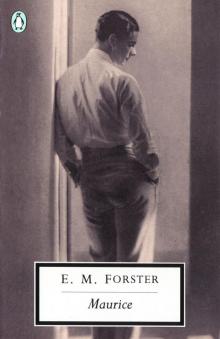 Maurice
Maurice The Longest Journey
The Longest Journey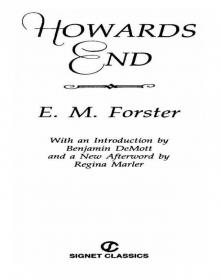 Howards End
Howards End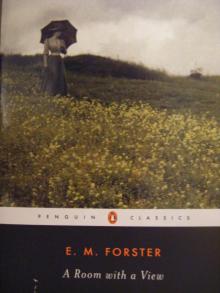 A Room with a View
A Room with a View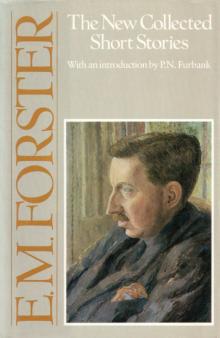 The New Collected Short Stories
The New Collected Short Stories A Passage to India
A Passage to India Where Angels Fear to Tread
Where Angels Fear to Tread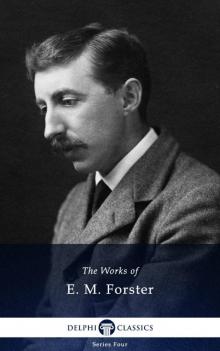 Works of E M Forster
Works of E M Forster Selected Stories
Selected Stories The Machine Stops
The Machine Stops Aspects of the Novel
Aspects of the Novel